The Samburu women beading their way to global markets
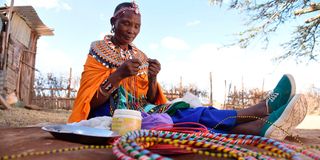
Reina Lelesiit weaving ushanga (beads) for sale at her home in Maralal, Samburu County on October 25, 2022. She is a beneficiary of a government initiative that's training pastoralist women on how to market their beads online.
What you need to know:
- Reina Lelesiit, a 57-year-old reformed cutter who is now engaged in the beadwork business.
- She operates a shop in Maralal town where she sells her beadwork accessories.
- She is among the women that are trained on the beadwork trade at the Catholic Pastoral Centre in Maralal town.
- The government through the Ushanga Initiative is training them on how to leverage on technology to sell their wares.
It's 3pm and we embark on a journey from Maralal town to Ngweta village, which is about 15 kilometres away.
About two kilometres later, we branch off from the tarmac and join a rough road. The sun is up and our vehicle leaves a cloud of dust behind us.
The place is sparsely populated. The huge tracts of land have no crops apart from bushes. The only visible ongoing activity are herds of cattle and goats grazing on almost bare grounds due to the effects of ongoing drought.
We drive for about 13 kilometres before our local guide tells the driver that we have reached our destination.
We see two houses about 500 meters ahead. An old timber house and a mud-walled house next to it. Also in the vicinity is a cow and goat shed made from old timbers.
“That’s our destination,” the local says as she points at the direction of the two houses. Our vehicle cannot move past the gate and we, therefore, walk under the scorching sun.
A few meters to the homestead, we can hear a woman singing. The melodious voice gets louder as we get closer. We are here to meet Reina Lelesiit, a 57-year-old reformed cutter who is now engaged in the beadwork business.
‘Karibuni’ (welcome) Ms Lelesiit says upon seeing us, as she continues with her song, which is Samburu language.
Ms Lelesiit is sitting on a dried cow skin and is busy making some beads as she belts out the lyrics of one of her favourite songs. Beading is a painstaking task that involves meticulous stitching and passing a thread through the tiny beads using a needle.
“This is what I do for a living,” Ms Lelesiit tells us as we settle down for a conversation.
Ms Lelesiit, a widow, confesses that she is a reformed cutter. She says she performed female genital mutilation (FGM) on girls and women in the area and beyond during her hey days.
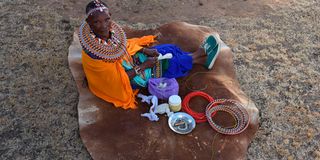
Ms Lelesiit weaving ushanga (beads) at her home in Maralal on October 25, 2022.
She cannot tell how many girls she cut because they were so many. For every girl cut, she would earn Sh300.
“I was so much sought after in the locality and I would traverse several villages to do the job,” she says.
Three years into the job, however, something drastic happened in her life. She started doing God’s work and got saved. Having received salvation, she could no longer engage in FGM.
With her source of income gone, she had to look for an alternative way to sustain herself. That is how she ended up in the beadwork business.
The mother of eight has been working in the beadwork business for the last 20 years and has no regrets.
“I have been able to educate all my children. Some of them have gone up to university and college. The last born is in secondary school. I have even built a house courtesy of the business,” she says.
Ms Lelesiit operates a shop in Maralal town where she sells her beadwork accessories. On a good day, she makes about Sh3,000. However on a bad day, she can make even less than Sh1,000.
The most biting challenge for her, she says, is lack of market for the products.
“Business has been very bad since the outbreak of the Covid-19. The tourists we relied on for our business are no longer coming. Their numbers have declined drastically, which has seen our sales dwindle,” she says.
The sun is setting and we are done with the interview. Ms Lelesiit escorts us to the gate of her simple homestead.
At the entrance, we meet with a herd of cattle and some goats as they come back home from the grazing field. The animals know her and they gladly follow her as she leads them to their respective sheds.
We part ways and promise to meet the following day at Maralal town where she and other women will be attending some training.
And as we head back to Maralal town to retire for the day, we cannot help but admire the resilience and determination of this Samburu woman.
The issue of lack of market for their products does not, however, only affect women involved in beadwork in Samburu, but also those from other six counties where the trade is practised.
However, the market challenge could soon come to an end if a new initiative being spearheaded by the government, in conjunction with other stakeholders, is anything to go by.
On this sunny morning at the Catholic Pastoral Centre in Maralal town, a group of about 50 women in the beadwork trade, among them Ms Lelesiit, are attending some training.
The women drawn from 15 registered cooperatives in Samburu County are gathered to learn how to use digital platforms to market their products.
The government through the Ushanga Initiative is training them on how to leverage on technology to sell their wares and expand their market scope.
Here, the women are learning how to use the newly launched E-commerce platform dubbed UshangaKenya.co.ke to market their beadwork to local and international markets.
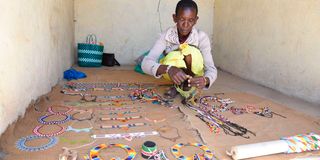
Monica Lowuapere, one of the training beneficiaries, arranges beads for sale on October 24,2022.
Apart from the E-commerce platform, they are also being trained on using other social media platforms like Instagram, Facebook, Tiktok and Twitter to market their work.
Already, some women in the beadwork business have started to sell their products on digital platforms, and they are smiling all the way to the bank.
Among the items they sell include beaded handbags, home furnishings, jewellery, cultural collectables, Kenya colours beaded necklace, beaded leather bracelets and beaded rungus.
Other products include beaded table mats, glasses, mirrors and other home furnishings.
The Ushanga Kenya Initiative is a national government flagship project that seeks to empower the pastoral women involved in beadwork by transforming their traditional art for significant economic benefit and sustainable livelihoods.
Kokan Ole Kelelue the head of creative and digital arts at Ushanga Initiative, is taking the women through today’s training.
This training follows the launch of the Ushanga USSD platform that targets to empower women in the bead work business.
Mr Ole Kelelue says through the USSD *789*700# and UshangaKenya.Co.ke, the women’s products will access wider markets, increase income from sale of their products digitally, which will help them gain economic independence and financial stability.
“The women are trained on how to post their products on social media platforms and how to engage with potential buyers. We have had instances where women have got big business through the digital platforms. We have had people ordering beads from Europe and have companies that have given us jobs through our social media pages,” Mr Ole Lelelue says.
He says digital marketing has presented a lucrative opportunity for the women, and explains that its biggest advantage is that it marks an end to brokers who have been the greatest beneficiaries of the business.
“What has been going on is nothing but total rip-off. It is the brokers who have been benefitting more instead of the women making the bead products. The digital platforms now come to change all this,” he notes.
A broker buys a Maasai shuka decorated with beads at Sh3,000 and sells the same at between Sh9,000 and Sh15,000 upper market.
Other wears go for less than Sh1,000 but can fetch up to Sh5,000 in tourist lodges.
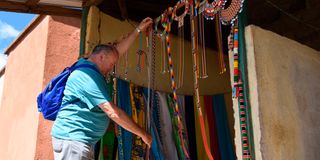
A tourist buys beads at a market in Maralal, Samburu County on October 24, 2022. The beads are made by local women.
The USSD platform will have a user management module with a database of the women and cooperatives working with Ushanga Kenya, making it possible to trace products right from original producers.
The platform is part of the government’s efforts to boost the sale of beadwork done by women and girls, by protecting the Internet Protocol address and legal rights relating to the products as well as preservation of culture.
Esther Mwanyama, head of production at Ushanga Initiative, terms the digital marketing as God sent for the women in pastoralist communities.
She tells Nation.Africa that two cooperatives in Kajiado, for example recently bagged two orders to supply clients with different bead work totalling Sh2.3 million.
“The digital platform has removed all the brokers and middlemen who ate the sweat of the women. The future no doubt looks bright for these women,” she says.
Some women who have tried marketing their wares digitally are all smiles.
Gladys Lewaton is one such. The 28-year-old sells her bead products at Pooro town near Maralal town, says selling her wares through the digital platform has increased her sales.
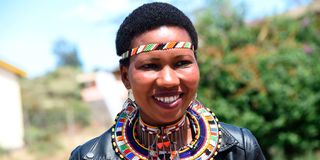
Gladys Letowon, one of the women in beading business speaks to Nation.Africa in Maralal, Samburu County on October 25, 2022.
Previously, Ms Letowon says, she would make between Sh1,000 and Sh3,000 a day. However, ever since she started selling her products on the digital platforms, her sales have increased from Sh3,000 to Sh6,000 a day.
The mother of three is optimistic that her sales revenue will increase as she continues selling her products online.
From the profit earned, Ms Letowon has so far, managed to save Sh200,000, which she hopes to use in paying the school fees for her son who is joining Form One next year.
“The experience so far, has been exciting and it is our hope that the digital platforms will help us to move our stocks, and increase our customer base. We have been having a lot of dead stock, especially after the outbreak of Covid-19,” Ms Letowon says.
Ushanga Kenya CEO Dorothy Mashipei hails the initiative.
“Going digital is the way to go as it will help in broadening the market for the beadwork products. A woman in Samburu can now post her bead work for potential clients from across the world to see and make orders,” Ms Mashipei says.
The CEO reveals that the government through the Ministry of Public Service and Gender will spearhead the marketing of bead products both locally and beyond, and also train women on coming up with high quality international standardized products for the global market,” she says.
Ms Mashipei notes that the digital marketing program will rope in women from the seven counties where beadwork business is practised among them Samburu, Kajiado, Narok, Baringo, Turkana, West-Pokot and Marsabit.
United Nation Population Fund (UNFPA) County Deputy Director, Dr Abiodun Oyeyipo observes that supporting women in the beading industry is instrumental in fighting harmful practises including FGM and child marriage in these counties.
Ushanga Initiative
“We are also linking them to the market to help them sell their products. Empowering women economically is one of the ways to help fight the harmful practices,” Dr Oyeyipo says.
The UNFPA boss reveals that the agency bought beads and other materials to support women in the bead making business both in Samburu and West-Pokot counties last year.
They also, in conjunction with Ushanga Initiative, trained the women on how to produce high quality beads.
Dr Oyeyipo also notes that his organisation in partner with the Ushanga Initiative and Ministry of Sports, Heritage and Culture, launched the Johari bracelet.
Johari bracelet, which was officially launched last year, is a cultural jewel normally won in the hand that acts as a tool of empowerment in the fight against FGM.
Jamila Ahmed, who is attending the digital marketing training for the first time, is optimistic that the digital platform will come to enhance her customer base and help her make more money.
Ms Ahmed, who sells her beadwork accessories in Baragoi, has not started marketing them on the digital platform, but is now ready after undergoing the training.
“I will now be posting my products on various social media and other digital platforms. I have been trained and I now have the requisite knowledge to even engage with my customers,” she says.
The mother of three is optimistic that the new marketing method will help her and other women in similar businesses to recover from the losses they have incurred since the onset of the Covid-19 pandemic.
Currently, she is making sales of about Sh2,000 to Sh3,000 a day. Her target is to make daily sales of at least Sh10,000 using the digital platforms.
The digital marketing platform targets women in 127 cooperatives drawn from seven pastoralist counties.
In Kenya, International Finance Corporation (IFC) estimates that tourists spent an average of $79 per tourist on handcraft purchases.
So far, more than 5,000 women have benefitted from the capacity building program and are able to make beads that meet diverse demands for the global clients.
.




